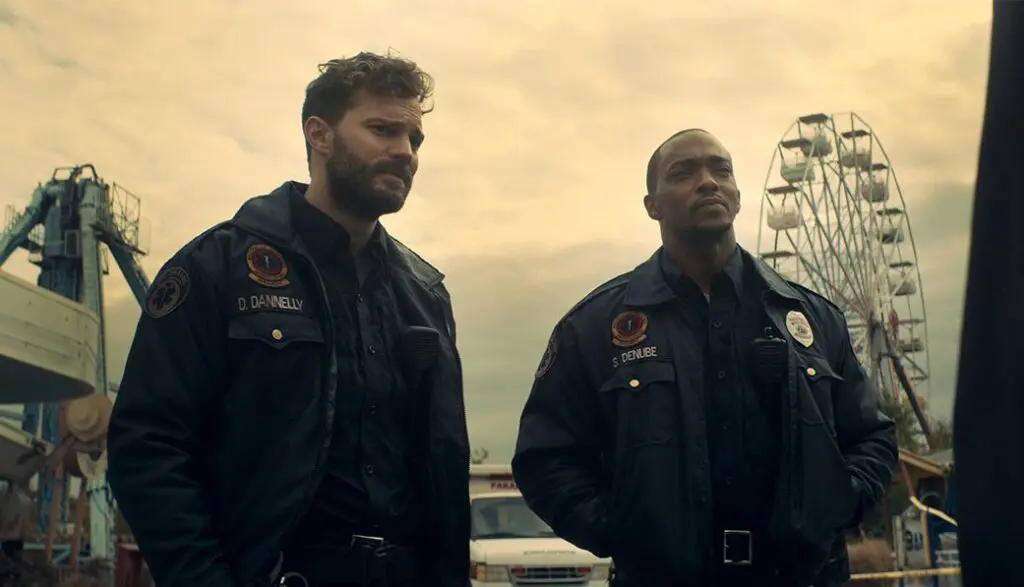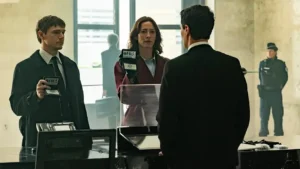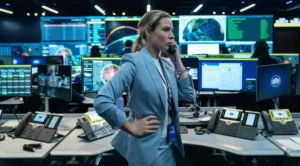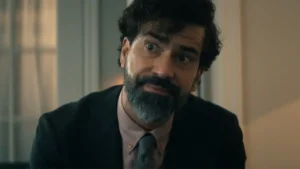One of the benefits of being a film-lover in this digital age is how many of the artists and performers we admire are accessible, within easy reach. The first film directors who I openly asked how I might see a copy of their new film were Aaron Moorhead and Justin Benson; Aaron connected me with their distributor, and I got a copy of The Endless in the post soon after. I’ve been building relationships – both with filmmakers I admire and distributors – ever since, but I’ve never forgotten that first Twitter handshake.
Two years later and I discover an aptitude for interviews (since all press activity has gone remote), so naturally as soon as I hear Moorhead and Benson are conducting interviews as part of their promotion for Synchronic, I put out my feelers again; this time I know who to ask. The pair are much more well-known by now and extremely busy, but I had the privilege of talking to them, via Zoom during a day full of press calls.
They were bemused to see my thirteen-year-old open the call with “are you the guys who made The Endless?” and once Aaron replied with “yeah, thanks for watching it!” I told the boy gently that I had some questions to ask, and I introduced myself. I mentioned that Twitter post that led to a review a couple of years ago and that I’d been a fan since before that due to watching Spring (“so excuse me if I get a little starstruck”) and Aaron took the chance to mention that Spring is soon to be re-released on BluRay in the UK “with a bunch of special features.”
I started by asking about the stars of their latest film, Synchronic: how on Earth did they choose Dornan and Mackie? It’s not the kind of film we would normally see either in. Justin responded, “this really weird thing happened. When The Endless was out doing its limited theatrical run, a talent agent from one of the big agencies saw it and liked it. And he just became a really big supporter and helped us get a script in the hands of Jamie and Anthony in a way that we’d never been able to do before. When we made the first three movies, we never had access to celebrity actors, though we tried. We just got really lucky: the right guy saw The Endless and helped us push through.” They had been excellent choices for the main characters: it was easy to forget their previous roles. That was especially the case for Jamie Dornan, who I had first seen as a killer in The Fall. “That’s what made us want him,” said Aaron.
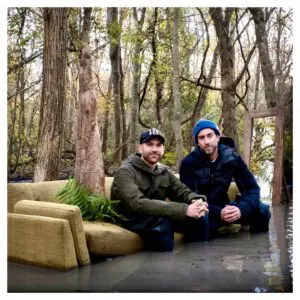 I had loved the location for Synchronic, the rich history of New Orleans that became such a strong aspect of the film. I asked the pair was it always going to be New Orleans, or did they consider other cities? Aaron responded, “I think it was always going to be New Orleans. Really early on in the development of the idea, there were two things that factored into New Orleans. One was if you’re going to make a movie about someone descending through layers of time, and using a designer drug, which implies it’s in the United States. So we asked ourselves which time periods of a city looked the most unique? New Orleans has French colonialism, Spanish colonialism, it was a swamp, it’s had Hurricane Katrina, the birth of jazz, racial tensions: enormous, different from each other, periods of history. If it was a painting, it would be like an oil painting that had been painted over, using the same canvass, over and over and over. Whereas with other cities, it’s like you start from a sketch and then it turns into that painting; and so the different time periods wouldn’t look so different from each other. The second thing was we genuinely thought where do we want to live and shoot for a few months? And where would our collaborators want to live and shoot? Because it is a lot harder to seduce someone who has a successful acting career to go and shoot in northern Canada, where it’s frozen; or something like that. That’s hard! But with New Orleans, everyone wants to do it! That was a lesser factor, but definitely something we considered. It would be entertaining to take what is basically our filmmaking club there.”
I had loved the location for Synchronic, the rich history of New Orleans that became such a strong aspect of the film. I asked the pair was it always going to be New Orleans, or did they consider other cities? Aaron responded, “I think it was always going to be New Orleans. Really early on in the development of the idea, there were two things that factored into New Orleans. One was if you’re going to make a movie about someone descending through layers of time, and using a designer drug, which implies it’s in the United States. So we asked ourselves which time periods of a city looked the most unique? New Orleans has French colonialism, Spanish colonialism, it was a swamp, it’s had Hurricane Katrina, the birth of jazz, racial tensions: enormous, different from each other, periods of history. If it was a painting, it would be like an oil painting that had been painted over, using the same canvass, over and over and over. Whereas with other cities, it’s like you start from a sketch and then it turns into that painting; and so the different time periods wouldn’t look so different from each other. The second thing was we genuinely thought where do we want to live and shoot for a few months? And where would our collaborators want to live and shoot? Because it is a lot harder to seduce someone who has a successful acting career to go and shoot in northern Canada, where it’s frozen; or something like that. That’s hard! But with New Orleans, everyone wants to do it! That was a lesser factor, but definitely something we considered. It would be entertaining to take what is basically our filmmaking club there.”
Aaron and Justin typically direct together, Aaron also does cinematography and Justin writes. I asked them how does that partnership work, and do they ever get tired of each other, working that closely? Justin replied, “No, it’s funny, it’s a hard thing to describe because we’ve worked together for so long. We’re actually really good friends as well as co-workers. And even with the amount of time we spend with each other, we can’t complain about making movies with our friends: if the alternative were to go into an office five days a week and we were around people who were forever complaining… we get to follow this insane dream and work with our friends. My past self would look at my future self and be like you need to adjust your expectations!” Aaron added, “to give you an idea, we’re in quarantine right now, shooting a no-budget project, just the two of us and our producer. We shot an insanely hard five-day week, then on Saturday we got together at 10am and did press all day, and then we rehearsed, and then we went to dinner together. And drinks. So like yeah, you can get sick of each other as human beings every once in a while but that has nothing to do with our relationship. Mostly we just work right next to each other all the time.”
Justin’s comment about a younger self reminded me of one of the extras I watched recently on The Endless BluRay, a humorous promotional piece about cloning themselves to make the film. I remarked that they must look back on that time now and notice how much things have developed since that period. Aaron laughed, “I just told you how we’re shooting a two-person movie!” Justin explained “we’re literally doing scenes for the last two weeks of like got the camera rig up? OK, now you hold the camera!” Aaron looked back: “This new thing is actually more similar to that sketch than The Endless was. The Endless had a crew of like twenty-five, and this one has a crew of three. And we’re two of them.” Synchronic was massive in comparison, and really the development I’d been thinking of. (My son had returned at this stage, added his comment that Synchronic was “absolutely amazing”, and Aaron was so delighted at having a schoolboy fan, he took a picture of his screen.) Justin agreed: “On one hand it’s bigger in scale, but on the other hand, believe it or not, Synchronic is actually a relatively low-budget film, punching above its weight. Most people would probably guess a bigger budget than it actually had.”
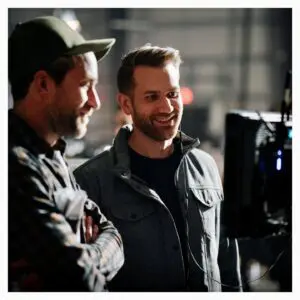 We turned the conversation away from Benson and Moorhead’s own films at that point and talked about other filmmakers they admire. Aaron seemed stuck at first but went for Linklater: “I just want to watch him do something. Linklater or Duplass.” Justin suggested: “I’d like to watch Danny Boyle work.” Then Justin raised a real collaboration I’d not been aware of: “We worked for Jordan Peele on a Twilight Zone episode and the little bit of time we spent around him was quite a treat. Just to see how cool and nice someone with that much pressure and clout and expectation and all these things can be.” Aaron added, “you know actually, I want to see Alex Garland work: that would be interesting.” Then going – as he said – somewhat out of the box Justin pondered working with Tom Waits: “He’s just an amazing all-around artist and I bet doing a film with him it would be really interesting to see how his mind works.”
We turned the conversation away from Benson and Moorhead’s own films at that point and talked about other filmmakers they admire. Aaron seemed stuck at first but went for Linklater: “I just want to watch him do something. Linklater or Duplass.” Justin suggested: “I’d like to watch Danny Boyle work.” Then Justin raised a real collaboration I’d not been aware of: “We worked for Jordan Peele on a Twilight Zone episode and the little bit of time we spent around him was quite a treat. Just to see how cool and nice someone with that much pressure and clout and expectation and all these things can be.” Aaron added, “you know actually, I want to see Alex Garland work: that would be interesting.” Then going – as he said – somewhat out of the box Justin pondered working with Tom Waits: “He’s just an amazing all-around artist and I bet doing a film with him it would be really interesting to see how his mind works.”
The publicist stepped in at that point, declaring time was running short, so I reviewed my notes to pick the best remaining question. I went for one which had been on my mind since I’d first heard about Synchronic: how does the story relate to the world of The Endless? I just didn’t see the connection. Justin opened my eyes: “There are a few connections, but there’s one big one. The drug Synchronic was originally intended to be a synthetic analog of the red flower from the region where The Endless takes place.” Aaron told me about another connection: “In that scene where Mackie’s character jumps back to the bayou, and there’s a bunch of worshipers who think he’s a deity, the main guy has a staff, but that staff is actually one of those hoodoo things.”
I was trying to ask a bit more about their work in progress, but my son stepped in with a final question: where did you get the word “Synchronic” and what does it mean? Justin answered my question (“this is the darkest thing we’ve ever done”) before handing over to Aaron for the Synchronic question. “Synchronic comes from the combination of the word ‘chronic’ which is slang for drugs, basically, but it’s also a linguistic term. If you look up the dictionary definition, it does have to do with things syncing up in time.”
And our interview ended, letting them move on to the next. I shall look forward to the next film too.

